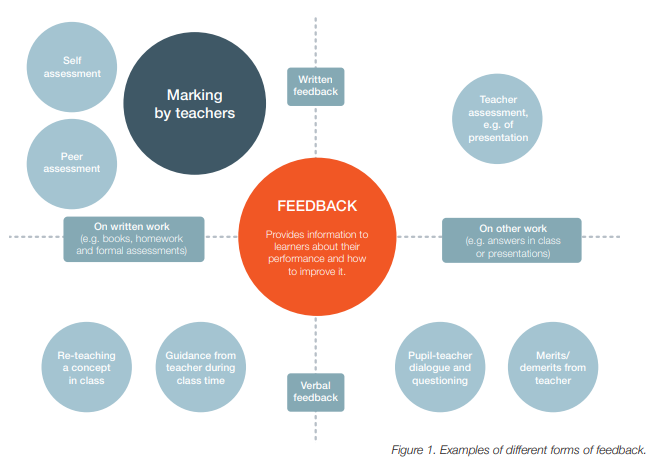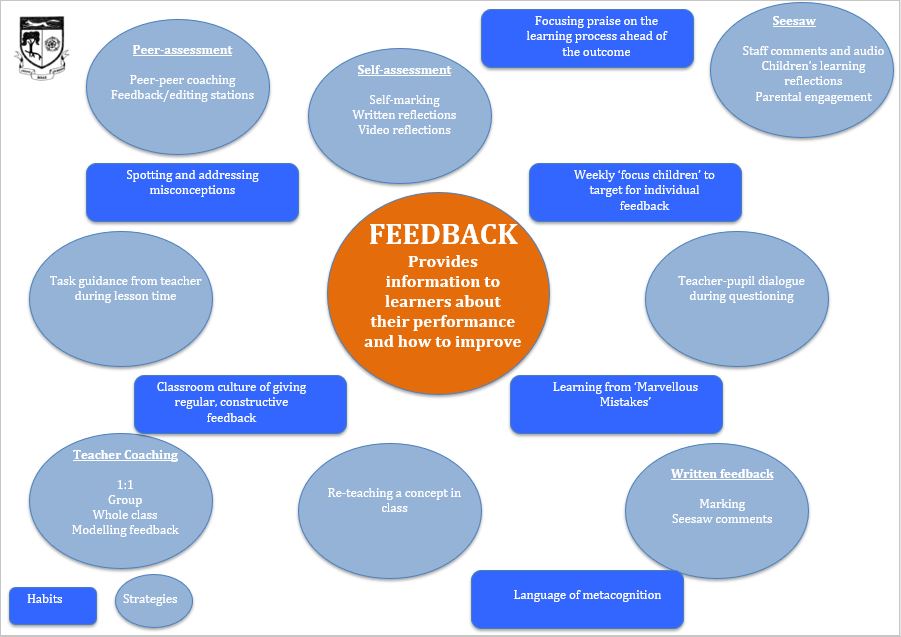Feedback at Grove Road has an ultimate aim of nurturing these core skills as children progress from Early Years to Year 6:
- Developing metacognitive strategies - methods used to help students understand the way they learn; in other words, it means processes designed for students to 'think' about their 'thinking'.
- Promoting self-regulated learners – where learning is guided by metacognition, strategic action (planning, monitoring, and evaluating personal progress against a standard), and motivation to learn. Self-regulated learners are successful because they control their learning environment.
- Developing a culture of self-efficacy - one's belief in their ability to succeed in specific situations or accomplish a task. One's sense of self-efficacy can play a major role in how one approaches goals, tasks, and challenges.
Non-negotiable elements to the feedback given to children at Grove Road:
- Feedback is given by all adults working with the children in the classroom
- Children are given opportunities to become aware of and reflect on their current performance and learning needs
- Children are given recognition and appropriate praise for effort, resilience and grit
- Staff respond to individual learning needs, and to the needs of the group
- ‘Traditional marking time’ is replaced by time spent reviewing the day’s learning in order to inform future planning, collective/individual target setting and misconception analysis.
- Staff are encouraging children to take responsibility for improving their own learning through self and peer-support/coaching
- Staff are incorporating language that encourages ‘growth-mindset’ and ‘metacognition’, including modelling the use of stem sentences to reflect upon the learning process.
- Staff are including a focus on celebrating ‘marvellous mistakes’ in their everyday practice.
Children across school should be given appropriate time to reflect on their learning.
In Early Years, children should be given opportunities to orally reflect on how they have found a task, and how they have performed on a specific activity using colour tags introduced in weekly Metacognition lessons.
In Key Stage 1, children should be beginning to make metacognitive reflections, verbal and written, self-mark/edit and make small improvements to their work. They can begin to edit their writing and spelling through effective guidance and feedback from the teacher. These improvements should be evidenced by children using green pen.
In Lower Key Stage 2, children should be given appropriate time to make metacognitive reflections, verbal and written, self-mark and make improvements to spelling, punctuation, grammar and vocabulary through effective guidance and feedback from the teacher. These improvements should be evidenced by children using green pen.
In Upper Key Stage 2, children should be given appropriate time to make metacognitive reflections, verbal and written, make improvements to the structure, spelling, punctuation, grammar and vocabulary within written work through effective guidance and feedback from the teacher. These improvements should be evidenced by children using green pen, and in English, often a re-draft of written work will take place with children producing a final, edited version.
All teachers create opportunities during lesson time, later that day or the following lesson to focus on misconceptions/marvellous mistakes, creating learning points through which children can improve the way they perform a task or piece of writing. All teachers create multiple opportunities to give 1:1 feedback during lessons based on what the children did in the previous lesson.
Conferencing – during lessons, teachers work with one child or a group of children to give them specific verbal feedback.
-
Editing/self-marked work should be evidenced in children’s books from Y1-Y6 using green.
-
Seesaw should be used regularly to share reflections with parents. Teachers could create ‘next step tasks’ on Seesaw to support children in working through misconceptions at home, and to celebrate when ‘marvellous mistakes’ have been made.
-
Formative and Summative assessment will enable a teacher to monitor pupils’ progress – ‘snapshot’/EYFS style formative assessment going on during ‘marking time’.
-
Annotations will be made on planning to identify trends and next steps for subsequent lessons / provision changes to support teachers with tracking progress over time. Annotations will include specific focus children for feedback in the next lesson.
-
Staff may, if they choose to, give a written ‘next step’ in books, however there must be clear evidence that this feedback has been acted upon in subsequent pieces of work.
In 2019, we have made the decision to no longer mark our children’s work in the ‘traditional sense’, where teachers write a positive comment and a next step for improvement in children’s learning books.
We have gradually replaced traditional marking with a culture of regular feedback, coaching and teacher-pupil dialogue that has a far greater impact on children’s learning, whilst increasing the capacity for teachers to spend time planning engaging and personalised learning opportunities.
As an example, in the past our KS1 & 2 teachers have spent approximately five hours per week ‘deep’ marking, highlighting one ‘positive’ and one next learning step stemming from a mistake for each child. The children then spent roughly 5 minutes responding to their written feedback. Often, this mistake continued to be made by the child in their next pieces of written work. This imbalance in ‘time vs. impact’ has led to lively global debate about the effectiveness/ineffectiveness of marking.
There is no doubt, however, that teacher feedback is of great importance to children’s learning, and is one of the key roles of a teacher. The feedback that a teacher gives to pupils has been seen for decades as one of the most important factors in how children learn. It occurs when teachers let their students know how well they are doing and what they ought to do to improve and move on to the next stage.
A toolkit created by the Education Endowment Foundation (EEF) charity, which looks at the effectiveness of different teaching interventions, said feedback can have an effect equivalent to giving children an extra eight months’ progress in a year. Recent research by John Hattie looking at the ‘effect sizes’ of 256 different teaching strategies, shows that ‘self-reported grades’, ‘self-efficacy’ and ‘metacognitive strategies’ have the greatest impact upon children’s learning, all of which are at the heart of our culture for personal growth and self-regulation at Grove Road.
Upon understanding how feedback impacts upon learning, it is important to consider that feedback takes many different forms in a primary classroom. This diagram from the EEF shows some of the different forms of feedback:
It is also important for us to give evidence-based reasons as to why we are prioritising different forms of feedback at Grove Road above ‘marking’.
A reference from the EEF paper ‘A Marked Improvement: A Review Of The Evidence On Written Marking’:
“Marking has the potential to be hugely time consuming. Marking was identified as the single biggest contributor to unsustainable workload in the Department for Education’s 2014 Workload Challenge – a consultation which gathered more than 44,000 responses from teachers, support staff and others. Approaches to marking vary widely in terms of
their content, intensity and frequency. For many teachers, it is not the time that each approach takes up by itself, but the cumulative requirement of combining several different approaches, in depth, across multiple classes each week, which can create a heavy workload.”
It is our vision for our children to leave primary education as established metacognitive thinkers and self-regulated learners. Essentially, self-regulation is about the extent to which learners are aware of their strengths and weaknesses and the strategies they use to learn. It describes how they can motivate themselves to engage in learning and develop strategies to enhance their learning and to improve. It will look different for learners of different ages, and for different tasks, but teachers will recognise these characteristics in their most effective learners.
Zimmerman, ‘Becoming a Self-Regulated Learner: An Overview’, gives a helpful description of what a successful self-regulated learner looks like:
‘These learners are proactive in their efforts to learn because they are aware of their strengths and limitations and because they are guided by personally set goals and task-related strategies, such as using an arithmetic addition strategy to check the accuracy of solutions to subtraction problems. These learners monitor their behaviour in terms of their goals and self-reflect on their increasing effectiveness. This enhances their self-satisfaction and motivation to continue to improve their methods of learning.’
EEF extract identifying the meaning of self-regulated learning:
“Self-regulated learning can be broken into three essential components that teachers need to know about to help their pupils to develop into successful learners:
Cognition is the mental process involved
in knowing, understanding, and learning.
By cognitive strategies, we mean skills like memorisation techniques or subject-specific strategies like making different marks with a brush or using different methods to solve equations in maths. This is the bread and butter of good teaching; cognitive strategies are fundamental to acquiring knowledge and completing learning tasks.
Metacognition is about the ways learners monitor and purposefully direct their learning. For example, having decided that a particular cognitive strategy for memorisation is likely to be successful, a pupil then monitors whether it has indeed been successful and then deliberately changes (or not) their memorisation method based on that evidence. By metacognitive strategies, we mean the strategies we use to monitor or control our cognition, such as checking that our memorisation technique was accurate or selecting the most appropriate cognitive strategy for the task we are undertaking.
Motivation is about our willingness to engage our metacognitive and cognitive skills and apply them to learning. Motivational strategies will include convincing oneself to undertake a tricky revision task now—affecting our current well-being—as a way of improving our future well-being in the test tomorrow.
Our aims
Our ultimate aim is to create a classroom culture of self-regulation, with teachers equipping children with the tools to become highly effective at reflecting on their own successes and areas for improvement. As a hub school for metacognition, following the ReflectED research project led by Rosendale Research school, we follow the following steps from the EEF summary of recommendations in order to let this culture develop:
- Teacher should acquire the professional understanding and skills to develop their pupils’ metacognitive knowledge.
- Explicitly teach metacognitive strategies including how to plan, monitor and evaluate their learning.
- Teachers should model their own thinking to help pupils develop their metacognitive and cognitive skills.
- Set an appropriate level of challenge to develop pupils’ self-regulation and metacognition.
- Promote and develop metacognitive talk in the classroom.
- Explicitly teach pupils how to organise and effectively manage their learning independently.
Grove Road Feedback Model
.png)


